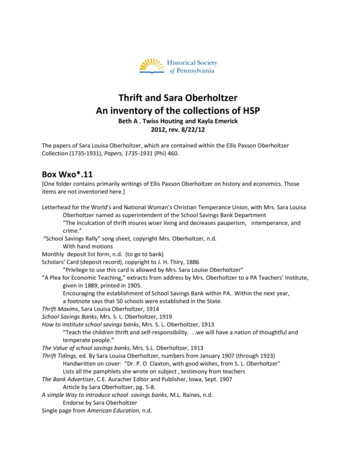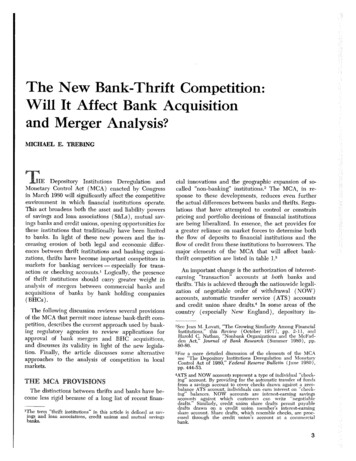
Transcription
DOVER THRIFT EDITIONSGENERAL EDITOR: PAUL NEGRIEDITOR OF THIS VOLUME: JOHN BERSETHCopyrightCopyright 2000 by Dover Publications, Inc.All rights reserved under Pan American and International Copyright Conventions.Theatrical RightsThis Dover Thrift Edition may be used in its entirety, in adaptation, or in any other way for theatricalproductions, professional and amateur, in the United States, without fee, permission, oracknowledgment. (This may not apply outside of the United States, as copyright conditions may vary.)Bibliographical NoteThis Dover edition, first published in 2000, contains the unabridged text of Tartuffe, based on the18th-century translation from the French by H. Baker and J. Miller. A new Note has been added.Library of Congress Cataloging-in-Publication DataMolière, 1622-1673.[Tartuffe. English]Tartuffe / Molière.p. cm.—(Dover thrift editions)9780486112848I. Title. II. Series.PQ1842 .A42 2000842’.4—dc2199-044074Manufactured in the United States of America
Dover Publications, Inc., 31 East 2nd Street, Mineola, N.Y. 11501
Note“MOLIÈRE” was the pseudonym of the French actor-manager and dramatist Jean Baptiste Poquelin(1622—1673). Born in Paris and educated at the Jesuit College de Clermont, Molière abandoned hisstudies and the prospect of a court appointment to form the company of the Illustre Theatre in 1643.The troupe was not a great success during its two years in the capital—a time when Molière wasimprisoned for nonpayment of debts—and began touring the French provinces in 1645. During thenext dozen or so years Molière developed his theatrical skills to a high degree. His by-now polishedcompany returned to Paris in 1658, under the patronage of Philippe, duc d’Orleans (the brother ofKing Louis XIV), and performed regularly before enthusiastic audiences. After a series of successfulruns at the Petit-Bourbon, the company moved to the Palais-Royal in 1661. The company became theTroupe du roi in 1665.Le Tartuffe ou l’imposteur was first performed at Versailles for the king in 1664. This three-actversion was then performed only sporadically over the next three years, because of objections to itscontent by religious critics. In fact, no play of Molière’s got him into such trouble with those inpower. He persisted, however, and presented an expurgated version of Tartuffe at the Palais-Royalin 1667. The play in its final form, the one we know today, was first performed in 1669. In thisproduction Molière played Orgon and his wife, Armande Bejart, played Elmire. In the originalFrench the play, like most of Molière’s work, was written in verse. The translation chosen for thisedition, by W. Baker and J. Miller, does not keep to the rhyming or even the versification, but rendersthe French into poetic English prose that is faithful to the spirit and beauty of the playwright’s originalwork.
Table of ContentsTitle PageCopyright PageNoteDramatis PersonnaeAct I.Act II.Act III.Act IVAct V.DOVER THRIFT EDITIONS
Dramatis PersonnaeMADAME PERNELLE — Orgon’s motherORGON — Elmire’s husbandELMIRE — Orgon’s wifeDAMIS—Orgon’s sonMARIANE — Orgon’s daughterVALÈRE — Mariane’s suitorCLÉANTE — Orgon’s brother-in-lawTARTUFFE — bogus holy manDORINE — waiting-maid to MarianeM. LOYAL — a bailiffA POLICE OFFICERFLIPOTE — Madame Pernelle’s maidThe scene is in Paris, in Orgon’s house
Act I.Scene I.MADAME PERNELLE, ELMIRE, MARIANE,DAMIS, CLÉANTE, DORINE, FLIPOTE.MME. PERNELLE. Come Flipote, let’s be gone, that I may get rid of them.ELMIRE. You walk so fast that one has much ado to follow you.MME. PERNELLE. Stay, daughter, stay; come no farther; this is all needless ceremony.ELMIRE. We only acquit ourselves of our duty to you; but pray, mother, what makes you in suchhaste to leave us?MME. PERNELLE. Because I can’t endure to see such management, and nobody takes any care toplease me. I leave your house, I tell you, very ill edified; my instructions are all contradicted. Youshow no respect for anything amongst you, every one talks aloud there, and the house is a perfectDover Court.DORINE. If—MME. PERNELLE. You are, sweetheart, a noisy and impertinent Abigail, and mighty free of youradvice on all occasions.DAMIS. But—MME. PERNELLE. In short, you are a fool, child; ’tis I tell you so, who am your grandmother; andI have told my son your father, a hundred times, that you would become a perfect rake and would benothing but a plague to him.MARIANE. I fancy—MME. PERNELLE. Good-lack, sister of his, you act the prude, and look as if butter would not meltin your mouth; but still waters, they say, are always deepest, and under your sly airs you carry on atrade I don’t at all approve of.ELMIRE. But mother—MME. PERNELLE. By your leave, daughter, your conduct is absolutely wrong in everything; youought to set them a good example, and their late mother managed ’em much better. You are a sorryeconomist, and what I can’t endure, dress like any princess. She who desires only to please herhusband, daughter, needs not so much finery.CLÉANTE. But madame, after all—MME. PERNELLE. As for you, sir, her brother, I esteem you very much, I love and respect you;
but yet, were I in my son’s her husband’s place, I should earnestly entreat you not to come within ourdoors. You are always laying down rules of life that good people should never follow. I talk a littlefreely to you, but ’tis my humour; I never chew upon what I have at heart.DAMIS. Your Monsieur Tartuffe is a blessed soul, no doubt—MME. PERNELLE. He’s a good man, and should be listened to; I can’t bear, with patience, to hearhim cavilled at by such a fool as you.DAMIS. What! shall I suffer a censorious bigot to usurp an absolute authority in the family? Andshall not we take the least diversion, if this precious spark thinks not fit to allow of it?DORINE. If one were to hearken to him, and give in to his maxims, we could do nothing but whatwould be made a crime of; for the critical zealot controls everything.MME. PERNELLE. And whatever he controls is well controlled. He would fain show you the wayto Heaven; and my son ought to make you all love him.DAMIS. No, look you, madame, neither father nor anything else can oblige me to have any regardfor him. I should belie my heart to tell you otherwise. To me his actions are perfectly odious; and Iforesee that, one time or other, matters will come to extremity between that wretch and me.DORINE. ’Tis downright scandalous to see an upstart take on him at that rate here. A vagabondthat had not a pair of shoes to his feet when he came hither, and all the clothes on his back would notfetch sixpence, that he should so far forget himself as to contradict everything and to play the master.MME. PERNELLE. Mercy on me! Matters would go much better, were everything managed by hispious directions.DORINE. He passes for a saint in your imagination; but, believe me, all he does is nothing buthypocrisy.MME. PERNELLE. What a tongue!DORINE. I would not trust him without good security, any more than I would his man Laurence.MME. PERNELLE. What the servant may be at bottom, I can’t tell; but I’ll answer for the masterthat he is a good man; you wish him ill, and reject him, only because he tells you the naked truth. ’Tissin that his heart can’t brook, and the interest of Heaven is his only motive.DORINE. Ay; but why, for some time past, can’t he endure that anybody should come near us?How can a civil visit offend Heaven, so much that we must have a din about it, enough to stun one?Among friends, shall I give you my opinion of the matter? [Pointing to ELMIRE] I take him, in troth,to be jealous of my lady.MME. PERNELLE. Hold your peace, and consider what you say. He is not the only person whocondemns these visits. The bustle that attends the people you keep company with, these coachescontinually planted at the gate, and the noisy company of such a parcel of footmen disturb the wholeneighbourhood. I am willing to believe there’s no harm done; but then it gives people occasion totalk, and that is not well.CLÉANTE. Alas, madame, will you hinder people from prating? It would be a very hard thing inlife, if for any foolish stories that might be raised about people, they should be forced to renouncetheir best friends; and suppose we should resolve to do so, do you think it would keep all the worldfrom talking? There’s no guarding against calumny. Let us therefore not mind silly tittle-tattle, and
let’s endeavour to live innocently ourselves, and leave the gossiping part of mankind to say what theyplease.DORINE. May not neighbour Daphne and her little spouse be the persons who speak ill of us?People whose own conduct is the most ridiculous are always readiest to detract from that of others.They never fail readily to catch at the slightest appearance of an affair, to set the news about with joy,and to give things the very turn they would have them take. By colouring other people’s actions liketheir own, they think to justify their conduct to the world, and fondly hope, by way of someresemblance, to give their own intrigues the air of innocence or to shift part of the blame elsewhere,which they find falls too hard upon themselves.MME. PERNELLE. All these arguments are nothing to the purpose. Orante is known to lead anexemplary life, her care is all for Heaven; and I have heard say that she has but an indifferent opinionof the company that frequents your house.DORINE. An admirable pattern indeed! She’s a mighty good lady, and lives strictly, ’tis true, but’tis age that has brought this ardent zeal upon her; and we know that she’s a prude in her own defence.As long as ’twas in her power to make conquests, she did not balk any of her advantages; but whenshe found the lustre of her eyes abate, she would needs renounce the world that was on the point ofleaving her; and under the specious mask of great prudence, conceals the decay of her worn-outcharms. That is the antiquated coquettes’ last shift. It is hard upon them to see themselves deserted byall their gallants. Thus forsaken, their gloomy disquiet can find no relief but in prudery; and then theseverity of these good ladies censures all and forgives none. They cry out aloud upon every one’sway of living, not out of a principle of charity, but envy, as not being able to suffer that another shouldtaste those pleasures which people on the decline have no relish for.MME. PERNELLE. [To ELMIRE] These are the idle stories that are told to please you, daughter.There’s no getting in a word at your house, for madame here engrosses all the talk to herself. But Ishall also be heard in my turn. I tell you my son never acted a wiser part than when he took thisdevout man into his family; that Heaven in time of need sent him hither to reclaim your wanderingminds; that ’tis your main interest to hearken to his counsels, and that he reproves nothing that is notblameable. These visits, balls, and assemblies are all the inventions of the wicked spirit; there’s notone word of godliness to be heard at any of them, but idle stuff, nonsense, and tales of a tub, and theneighbours often come in for a share; there’s nobody they’ll stop at to vilify. In short, the heads ofreasonable people are turned by the confusion of such meetings. A thousand different fancies arestarted about less than nothing; and as a good doctor said the other day very well, ’Tis a perfectTower of Babel, for every one here babbles out of all measure. Now to give you an account of whereall this comes in. [Pointing to CLÉANTE] What! is that spark giggling already? Go look for yourfool to make a jest of, and unless—[To ELMIRE] Good-bye t’ye, daughter, I shall say no more.Depend on it, I have not half the esteem for your house I had, and it shall be very fine weather when Iset my foot in your doors again. [Giving FLIPOTE a box on the ear] Come, you, you’re dreaming andgaping at the crows; i’fakins! I’ll warm your ears for you. Let’s march, trollop, let’s march.Scene II.CLÉANTE, DORINE.CLÉANTE. I won’t go, for fear she should fall foul on me again. That this good old lady—
DORINE. ’Tis pity, truly, she does not hear you call her so; she’d give you to understand how sheliked you, and that she was not old enough to be called so yet.CLÉANTE. What a heat has she been in with us about nothing! And how fond does she seem of herTartuffe!DORINE. Oh! truly, all this is nothing compared to the infatuation of her son, and were you to seehim you’d say he was much worse. His behaviour in our public troubles had procured him thecharacter of a man of sense, and of bravery for his prince; but he’s grown quite besotted since hebecame fond of Tartuffe. He calls him brother, and loves him in his heart a hundred times better thaneither mother, son, daughter, or wife. He’s the only confidant of all his secrets, and the wise directorof all his actions; he caresses, he embraces him, and I think one could not have more affection for amistress. He will have him seated at the upper end of the table, and is delighted to see him gobble asmuch as half a dozen. He must be helped to all the tit-bits, and whenever he but belches, he bids G—dbless him. In short, he dotes upon him, he’s his all, his hero; he admires all he does, quotes him on alloccasions, looks on every trifling action of his as a wonder, and every word an oracle. At the sametime the fellow, knowing his blind side and willing to make the most on’t, has a hundred tricks toimpose upon his judgment and get his money from him in the way of bigotry. He now pretends truly totake the whole family to task; even the awkward fool his foot-boy takes upon him to lecture us withhis fanatic face, and to demolish our patches, paint, and ribbons. The rascal, the other day, tore us afine handkerchief that lay in the Pilgrim’s Progress, and cried that it was a horrid profanation to mixhellish ornaments with sanctified things.Scene III.ELMIRE, MARIANE, DAMIS, CLÉANTE, DORINE.ELMIRE. [To CLÉANTE] You are very happy in not having come to the harangue she gave us atthe gate. But I saw my husband, and as he did not see me, I’ll go up to wait his coming.CLÉANTE. I’ll wait for him here by way of a little amusement, only bid him good-morrow.DAMIS. Hint something to him about my sister’s wedding; I suspect that Tartuffe’s against it, andthat he puts my father upon these tedious evasions; you are not ignorant how nearly I am concerned init. If my friend Valère and my sister are sincerely fond of one another, his sister, you know, is no lessdear to me, and if it must—DORINE. Here he is.Scene IV.ORGON, CLÉANTE, DORINE.ORGON. Hah! brother, good-morrow.CLÉANTE. I was just going, and am glad to see you come back. The country at present is not verypleasant.ORGON. Dorine. [To CLÉANTE] Brother, pray stay; you’ll give me leave just to inquire the newsof the family; I can’t be easy else. [To DORINE] Have matters gone well the two days I have been
away? What has happened here? How do they all do?DORINE. My lady the day before yesterday had a fever all day, and was sadly out of order with astrange headache.ORGON. And Tartuffe?DORINE. Tartuffe? Extremely well, fat, fair, and fresh-coloured.ORGON. Poor man!DORINE. At night she had no stomach, and could not touch a bit of supper, the pain in her headcontinued so violent.ORGON. And Tartuffe?DORINE. He supped by himself before her, and very heartily ate a brace of partridge, and half aleg of mutton hashed.ORGON. Poor man!DORINE. She never closed her eyes, but burnt so that she could not get a wink of sleep; and wewere forced to sit up with her all night.ORGON. And Tartuffe?DORINE. Being agreeably sleepy, he went from table to his chamber, and so into a warm bed, andslept comfortably till next morning.ORGON. The poor man!DORINE. At length my lady, prevailed upon by our persuasions, resolved to be let blood; then shesoon grew easier.ORGON. And Tartuffe?DORINE. He plucked up his spirit, as he should; and fortifying his mind against all evils, to makeamends for the blood my lady lost, drank at breakfast four swingeing draughts of wine.ORGON. The poor man!DORINE. At present they both are pretty well, and I shall go before and let my lady know howglad you are of her recovery.Scene V.ORGON, CLÉANTE.CLÉANTE. She jokes upon you, brother, to your face; and without any design of making you angry,I must tell you freely that ’tis not without reason. Was ever such a whim heard of? Is it possible that aman can be so bewitching at this time of day as to make you forget everything for him? That afterhaving, in your own house, relieved his indigence, you should be ready to—ORGON. Hold there, brother, you don’t know the man you speak of.CLÉANTE. Well, I don’t know him, since you will have it so. But then, in order to know what aman he is,—
ORGON. Brother, you would be charmed did you know him, and there would be no end of yourraptures. He’s a man—that—ah—a man—a man, in short, a man. Who always practises as he directs,enjoys a profound peace, and regards the whole world no more than so much dung. Ay, I am quiteanother man by his conversation. He teaches me to set my heart upon nothing; he disengages my mindfrom friendships or relations; and I could see my brother, children, mother, wife, all expire, and notregard it more than this.CLÉANTE. Humane sentiments, brother, I must confess!ORGON. Ah! had you but seen him as I first met with him, you would have loved him as well as Ido. He came every day to church with a composed mien, and kneeled down just against me. Heattracted the eyes of the whole congregation by the fervency with which he sent up his prayers toHeaven. He sighed and groaned very heavily, and every moment humbly kissed the earth. And when Iwas going out, he would advance before and offer me holy water at the door. Understanding by hisboy (who copied him in everything) his low condition and who he was, I made him presents; but healways modestly would offer to return me part. ’Tis too much, he’d say, too much by half. I am notworth your pity. And when I refused to take it again, he would go and give it among the poor beforemy face. At length Heaven moved me to take him home, since which everything here seems toprosper. I see he reproves without distinction; and that even with regard to my wife, he is extremelycautious of my honour. He acquaints me who ogles her, and is six times more jealous of her than I am.But you can hardly imagine how very good he is. He calls every trifle in himself a sin; he’sscandalised at the smallest thing imaginable, so far that the other day he told me he had caught a fleaas he was at his devotions, and had killed it, he doubted, in rather too much anger.CLÉANTE. ’Sdeath! you must be mad, brother, I fancy; or do you intend to banter me by such stuff?What is it you mean? All this fooling—ORGON. Brother, what you say savours of libertinism. You are a little tainted with it; and, as Ihave told you more than once, you’ll draw down some heavy judgment on your head one day or other.CLÉANTE. This is the usual strain of such as you. They would have everybody as blind asthemselves. To be clear-sighted is libertinism, and such as don’t dote upon empty grimaces haveneither faith nor respect to sacred things. Come, come, all this discourse of yours frights not me; Iknow what I say, and Heaven sees my heart. We are not to be slaves to your men of form. There arepretenders to devotion as well as to courage. And as we never find the truly brave to be such as makemuch noise wheresoever they are led by honour, so the good and truly pious, who are worthy of ourimitation, are never those that deal much in grimace. Pray, would you make no distinction betweenhypocrisy and true devotion? Would you term them both alike, and pay the same regard to the mask asyou do to the face? Would you put artifice on the level with sincerity, and confound appearance withreality? Is the phantom of the same esteem with you as the figure? and is bad money of the same valueas good? Men generally are odd creatures. They never keep up to true nature. The bounds of reasonare too narrow for them. In every character they overact their parts, and the noblest designs very oftensuffer in their hands because they will be running things into extremes and always carry things too far.This, brother, by the by.ORGON. Yes, yes, you are without doubt a very reverend doctor; all the knowledge in the worldlies under your cap. You are the only wise and discerning man, the oracle, the Cato of the present age;all men, compared to you, are downright fools.CLÉANTE. No, brother, I am none of your reverend sages, nor is the whole learning of the
universe vested in me; but I must tell you I have wit enough to distinguish truth from falsehood. Andas I see no character in life more great or valuable than to be truly devout, nor anything more noble,or more beautiful, than the fervour of a sincere piety, so I think nothing more abominable than theoutside daubing of a pretended zeal, than those mountebanks, those devotees in show, whosesacrilegious and treacherous grimace deceives with impunity, and according as they please, make ajest of what is most venerable and sacred among men. Those slaves of interest who make a trade ofgodliness, and who would purchase honours and reputation with a hypocritical turning up of the eyesand affected transports. Those people, I say, who show an uncommon zeal for the next world in orderto make their fortunes in this, who, with great affectation and earnestness, daily recommend solitude,while they live in courts. Men who know how to make their own vices consistent with their zeal; theyare passionate, revengeful, faithless, full of artifice; and to effect a man’s destruction, they insolentlyurge their private resentment as the cause of Heaven; being so much the more dangerous in their wrathas they point against us those weapons which men reverence, and because their passions prompt themto assassinate us with a consecrated blade. There are too many of this vile character, but the sincerelydevout are easily known; our age, brother, affords us some of these who might serve for gloriouspatterns to us. Observe Aristo, Periander, Orontes, Alcidamas, Polidore, Clitander; that title isrefused to them by nobody. These are not braggadocios in virtue. We see none of this insufferablehaughtiness in their conduct, and their devotion is humane and gentle. They censure not all we do, theythink there’s too much pride in these corrections, and leaving the fierceness of words to others,reprove our actions by their own. They never build upon the appearance of a fault, and are alwaysready to judge favourably of others. They have no cabals, no intrigues to carry on; their chief aim is tolive themselves as they should do. They never worry a poor sinner; their quarrel is only with theoffence. Nor do they ever exert a keener zeal for the interest of Heaven than Heaven itself does.These are the men for me; this is the true practice, and this the example fit to be followed. Your manis indeed not of this stamp. You cry up his zeal out of a good intention, but I believe you are imposedon by a very false gloss.ORGON. My dear brother, have you done?CLÉANTE. Yes.ORGON. [Going] Then I’m your humble servant.CLÉANTE. Pray one word more, brother; let us leave this discourse. You know you promised totake Valère for your son-in-law.ORGON. Yes.CLÉANTE. And have appointed a day for this agreeable wedding.ORGON. True.CLÉANTE. Why then do you put off the solemnity?ORGON. I can’t tell.CLÉANTE. Have you some other design in your head?ORGON. Perhaps so.CLÉANTE. Will you break your word, then?ORGON. I don’t say that.
CLÉANTE. I think there’s no obstacle can hinder you from performing your promise.ORGON. That’s as it happens.CLÉANTE. Does the speaking of a single word require so much circumspection, then? Valèresends me to you about it.ORGON. Heaven be praised!CLÉANTE. What answer shall I return him?ORGON. What you will.CLÉANTE. But ’tis necessary I should know your intentions; pray what are they?ORGON. To do just what Heaven pleases.CLÉANTE. But to the point, pray. Valère has your promise; do you stand to it, ay or no?ORGON. Good be t’ye.CLÉANTE. [Alone] I am afraid he’ll meet with some misfortune in his love. I ought to inform himhow matters go.
Act II.Scene I.ORGON, MARIANE.ORGON. Mariane!MARIANE. Sir.ORGON. Come hither; I have something to say to you in private.MARIANE. [To ORGON, who is looking into a closet] What are you looking for, sir?ORGON. I’m looking if anybody’s there who might overhear us. This little place is fit for such apurpose. So, we’re all safe. I have always, Mariane, found you of a sweet disposition, and you havealways been very dear to me.MARIANE. I am very much obliged to you, sir, for your fatherly affection.ORGON. ’Tis very well said, daughter, and to deserve it, your chief care should be to make meeasy.MARIANE. That is the height of my ambition.ORGON. Very well. Then what say you of Tartuffe, our guest?MARIANE. Who, I?ORGON. Yes, you; pray take heed how you answer.MARIANE. Alas! sir, I’ll say what you will of him.Scene II.ORGON, MARIANE, DORINE, who comes in softly, and stands behind ORGON without beingseen.ORGON. That’s discreetly said. Tell me then, my girl, that he’s a very deserving person, that youlike him, and that it would be agreeable if, with my consent, you might have him for a husband, ha?MARIANE. How, sir?ORGON. What’s the matter?MARIANE. What said you?ORGON. What?MARIANE. Did I mistake you?
ORGON. As how?MARIANE. Whom would you have me say I liked, sir, and should be glad, with your approbation,to have for a husband?ORGON. Tartuffe.MARIANE. I protest to you, sir, there’s nothing in it. Why would you make me tell you such astory?ORGON. But I would have it to be no story, and ’tis enough that I have pitched upon him for you.MARIANE. What, would you, sir—ORGON. Ay, child, I purpose, by your marriage, to join Tartuffe to my family. I have resolvedupon’t, and as I have a right to—[Spying DORINE] What business have you there? Your curiosity isvery great, sweetheart, to bring you to listen in this manner.DORINE. In troth, sir, whether this report proceeds from conjecture or chance, I don’t know; butthey have been just telling me the news of this match, and I have been making a very great jest of it.ORGON. Why, is the thing so incredible?DORINE. So incredible that were you to tell me so yourself, I should not believe you.ORGON. I know how to make you believe it, though.DORINE. Ay, ay, sir, you tell us a comical story.ORGON. I tell you just what will prove true in a short time.DORINE . Stuff!ORGON. [To MARIANE] Daughter, I promise you I’m not in jest.DORINE. Go, go; don’t believe your father, madame, he does but joke.ORGON. I tell you—DORINE. No, ’tis in vain, nobody will believe you.ORGON. My anger at length—DORINE. Well, sir, we will believe you; and so much the worse on your side. What, sir, is itpossible that with that air of wisdom, and that spacious beard on your face, you should be weakenough but to wish—ORGON. Harkee, you have taken certain liberties of late that I dislike. I tell you that, child.DORINE. Good sir, let us argue this affair calmly. You really must banter people by this scheme.Your daughter is not cut out for a bigot; he has other things to think on. And then, what will such analliance bring you in? For what reason would you go, with all your wealth, to choose a beggar for ason-in-law—ORGON. Hold your tongue! If he has nothing, know that we ought to esteem him for it. His povertyis an honest poverty which raises him above all grandeur, because he has suffered himself, in short, tobe deprived of his fortune by his negligence for things temporal and his strong attachment to thingseternal. But my assistance may put him in a way of getting out of trouble and of recovering his own.As poor as he is, he’s a gentleman, and the estate he was born to is not inconsiderable.
DORINE. Yes, he says so; and this vanity, sir, does not very well suit with piety. He that embracesthe simplicity of a holy life should not set forth his name and family so much. The humble procedureof devotion does but ill agree with the glare of ambition. To what purpose all this pride?—But thistalk offends you. Then let us lay aside his quality, and speak to his person. Can you have the heart tofling away such a girl as this upon such a man as he? Should you not consult propriety, and look alittle forward to the consequences of such a union as this? Depend upon’t, a young woman’s virtue isin some danger when she isn’t married to her mind; that her living virtuously afterward depends, in agreat measure, upon the good qualities of her husband; and that those whom people everywhere pointat with the finger to the forehead, often make their wives what we find they are. It is no easy task to befaithful to some sorts of husbands; and he that gives his daughter a man she hates, is accountable toHeaven for the slips she makes. Consider then to what danger your design exposes you.ORGON. I tell you, she is to learn from me what to do.DORINE. You could not do better with her than to follow my advice.ORGON. Don’t let us amuse ourselves, daughter, with this silly stuff. I am your father, and knowwhat you must do. I had indeed promised you to Valère, but, besides that ’tis reported he is given toplay, I suspect him of being a little profligate. I don’t observe that he frequents the church.DORINE. Would you have him run to church at your precise hours, as people do who go there onlyto be taken notice of?ORGON. I am not consulting you about it. [To his daughter ] The other, in short, is a favourite ofHeaven, and that is beyond any other possessions. This union will crown your wishes with every sortof good; it will be one continued scene of pleasure and delight. You’ll live in faithful love together,really like two children, like two turtle-doves. No unhappy debate will e’er rise between you; andyou’ll make anything of him you can well desire.DORINE. She?
French the play, like most of Molière’s work, was written in verse. The translation chosen for this edition, by W. Baker and J. Miller, does not keep to the rhyming or even the versification, but renders the French into poetic English prose that is faithful to











